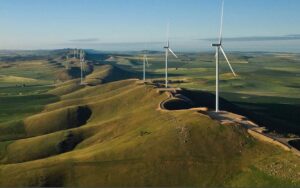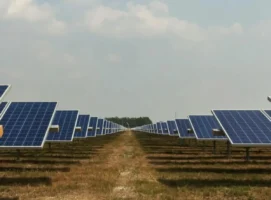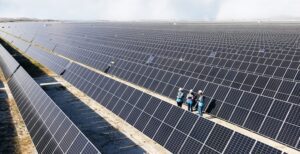Climate Change Minister Greg Combet got a warm round of applause when he announced at Carbon Expo in Melbourne that Australia was prepared to sign up to the second round of the Kyoto Protocol – subject to certain conditions. Australia was the last one to join the KP when Kevin Rudd announced his signature in one of his first acts as Prime Minister, but it will remain part of a small group – the EU, Switzerland Norway and possible New Zealand – that account for just 14 per cent of the world’s emissions.
Australia’s motives are mostly self interested – it wants to keep the Carbon Price Mechanism afloat so Australian companies can access cheap international credits, and it wants it favourable rulings that came with its formal agreement for the first round, including the so-called “Australia clause” on land use assessments, to stay in place, and a carry-over of excess credits from the first phase.
However, there is a broader significance, and that is that it will be an important boost to negotiations for a new climate treaty, which will begin in earnest at Doha later this month. Most developing countries regard the maintenance of the KP as an “act of faith” by the developing world, and Australia’s proposed involvement means that it will have more than just a European component. Other nations will, however, have to overcome their opposition to Australia’s conditions. While Combet said Australia wanted the second phase to extend to 2020, rather than just 2017 as favoured by others, he said Australia remained open to the possibility of expanding its emissions reduction target beyond 5 per cent, should others take similar action. The issue of 2020 commitments, apart from a new all encompassing treaty, will be one of the main themes, and sticking points, of the talks in Qatar – one of the few nation states that has a rate of emissions per capita higher than Australia’s
Obama’s second term
Will he, or won’t he? That was the question being put after the re-election of President Barack Obama, who promised so much on climate change and clean energy, and delivered comparatively little in his first term. Still, it was a key component of his acceptance piece, and whether or not the US throws itself into international climate change negotiations with renewed vigour, or contemplates a domestic carbon price, his success is certainly good news for the clean energy industry.
There are two things that Obama’s election mean for the energy industry. The first is that the investment tax credits that are so important to the wind industry in the US will likely be extended. The second is that the Environmental Protection Authority, which is doing so much to cleaning up and closing down coal in the US, will be able to continue its work. (The Republicans had promised to close it down). And Obama will protect the various Department of Energy initiatives, such as its Solar Sunshot initiative designed to ensure large scale solar is cheaper than oil and gas by the end of the decade, and its loan guarantees program that the Republicans were also so desperate to shoot down.
HSBC Bank said the carbon tax could come back on the agenda because it might be a palatable way of addressing the huge fiscal deficit. In any case, investors had little doubt about the significance of the day. Coal stocks bore the brunt of a major sell-off on the days following the election, after enjoying a one month rally on hopes that Mitt Romney. Among the biggest losers were industry Peabody Coal, which lost 10 per cent, or more than $700 million, of its value, and a host of smaller stocks such as Jams River Coal that slumped 25 per cent in a single session.
Climate change and elections
The US elections are so huge and complex, that in some states it takes voters 20 minutes to fill in the forms, even after queuing for hours. But hold some fascinating stories. While climate change was not mentioned by the presidential candidates in their debates, and did not make it onto the political agenda until Hurricane Sandy appeared and New York mayor Michael Bloomberg made his climate-inspired endorsement of Obama, things were happening in the background.
A group of five “flat Earther” Republican candidates who rejected the climate science were targeted by a group called the League of Conservation Voters, which said it spent $3 million campaigning against them. Three of the Republican representatives from New York, Texas and Illinois lost their seats and the status of the other two was still unclear. In the state of Michigan, however, an attempt to write a 25 per cent renewables target into the state’s constitution was lost after fossil fuel interests spent $35 million campaigning against it.
A poor return on investment
This, though, was just a drop in the ocean. Of the estimated $6 billion spent on television ads on the Presidential, House, and Senate races, some $270 million was directed at the promotion of oil, gas, and coal interests just in the last two months, according to a Center for American analysis of data from Kantar Media. There were some 59,600 spots ran on energy and environmental issues in the presidential race and key House and Senate races. Since April, outside polluter allied groups spent $265.9 million on campaign ads in the presidential race alone. In addition to direct spending on specific electoral campaigns, they also pumped millions of dollars into generic “branding” campaigns promoting oil, gas, and coal interests, such as the American Petroleum Institute’s “I’m an energy voter” campaign. From September 1 through November 5, for example, the American Coalition for Clean Coal Electricity and the American Petroleum Institute spent $5.5 million on these types of ads, Climate Progress reported.
Stark warnings and white papers
But it’s not just politicians and environmental groups and scientists making the warnings to business, it’s also established corporate entities such as the global accounting giant PwC, which this week released its latest climate index, warning that the world was hurtling towards a 6C warming scenario, unless it accelerated its efforts to decarbonise by a factor of four, and maintained that for around four decades.
It said the only way to avoid the pessimistic scenarios will be radical transformations in the ways the global economy currently functions, rapid uptake of renewable energy, sharp falls in fossil fuel use or massive deployment of CCS, removal of industrial emissions and halting deforestation. “Business leaders have been asking for clarity in political ambition on climate change. Now one thing is clear: businesses, governments and communities across the world need to plan for a warming world – not just 2ºC, but 4ºC and, at our current rates, 6ºC.”
Back in Australia, Martin Ferguson unveiled Australia’s Energy White Paper, the blueprint for Australia’s energy future. For a global take, read our story on Ferguson Spies a green energy future, and steps on the gas, and we also have a summary of the major talking points from the paper.
Australia’s solar benchmark.
Australia surpassed the 2GW milestone of solar PV some time in November, thanks to an investment of several billion dollars by Australian families to install panels on their rooftops. Curiously enough, the Czech Republic also moved passed the 2GW milestone this week, while Italy clocked up 16GW. In September, Germany added 1GW in a single month, taking its total for the year to 6GW and its cumulative total to nearly 35GW. The US is expected to reach 4GW this year and 32GW by 2016.








